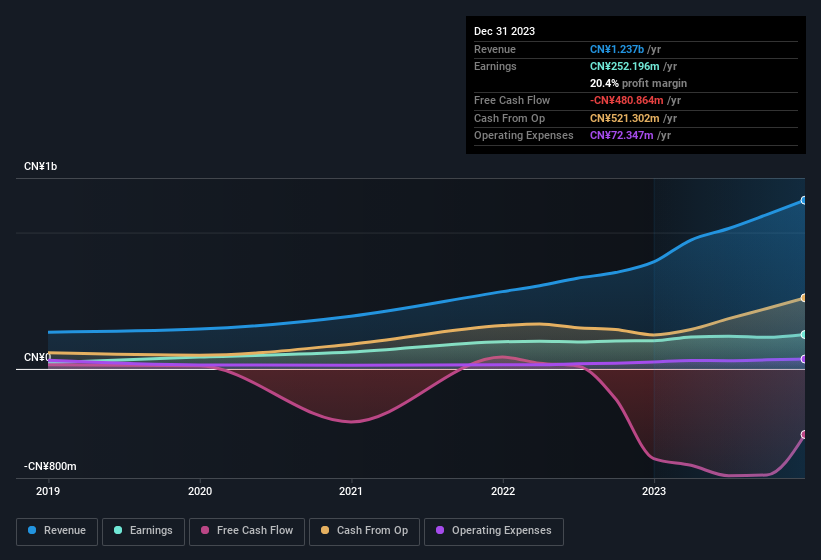- China
- /
- Marine and Shipping
- /
- SHSE:603209
We Think You Should Be Aware Of Some Concerning Factors In Xingtong Shipping's (SHSE:603209) Earnings

Xingtong Shipping Co., Ltd.'s (SHSE:603209 ) stock didn't jump after it announced some healthy earnings. We think that investors might be worried about some concerning underlying factors.
Check out our latest analysis for Xingtong Shipping

Examining Cashflow Against Xingtong Shipping's Earnings
In high finance, the key ratio used to measure how well a company converts reported profits into free cash flow (FCF) is the accrual ratio (from cashflow). In plain english, this ratio subtracts FCF from net profit, and divides that number by the company's average operating assets over that period. You could think of the accrual ratio from cashflow as the 'non-FCF profit ratio'.
Therefore, it's actually considered a good thing when a company has a negative accrual ratio, but a bad thing if its accrual ratio is positive. While it's not a problem to have a positive accrual ratio, indicating a certain level of non-cash profits, a high accrual ratio is arguably a bad thing, because it indicates paper profits are not matched by cash flow. Notably, there is some academic evidence that suggests that a high accrual ratio is a bad sign for near-term profits, generally speaking.
Over the twelve months to December 2023, Xingtong Shipping recorded an accrual ratio of 0.28. We can therefore deduce that its free cash flow fell well short of covering its statutory profit. Even though it reported a profit of CN¥252.2m, a look at free cash flow indicates it actually burnt through CN¥481m in the last year. We also note that Xingtong Shipping's free cash flow was actually negative last year as well, so we could understand if shareholders were bothered by its outflow of CN¥481m.
That might leave you wondering what analysts are forecasting in terms of future profitability. Luckily, you can click here to see an interactive graph depicting future profitability, based on their estimates.
Our Take On Xingtong Shipping's Profit Performance
Xingtong Shipping didn't convert much of its profit to free cash flow in the last year, which some investors may consider rather suboptimal. Because of this, we think that it may be that Xingtong Shipping's statutory profits are better than its underlying earnings power. Nonetheless, it's still worth noting that its earnings per share have grown at 37% over the last three years. The goal of this article has been to assess how well we can rely on the statutory earnings to reflect the company's potential, but there is plenty more to consider. So if you'd like to dive deeper into this stock, it's crucial to consider any risks it's facing. To help with this, we've discovered 2 warning signs (1 doesn't sit too well with us!) that you ought to be aware of before buying any shares in Xingtong Shipping.
Today we've zoomed in on a single data point to better understand the nature of Xingtong Shipping's profit. But there are plenty of other ways to inform your opinion of a company. For example, many people consider a high return on equity as an indication of favorable business economics, while others like to 'follow the money' and search out stocks that insiders are buying. So you may wish to see this free collection of companies boasting high return on equity, or this list of stocks that insiders are buying.
If you're looking to trade Xingtong Shipping, open an account with the lowest-cost platform trusted by professionals, Interactive Brokers.
With clients in over 200 countries and territories, and access to 160 markets, IBKR lets you trade stocks, options, futures, forex, bonds and funds from a single integrated account.
Enjoy no hidden fees, no account minimums, and FX conversion rates as low as 0.03%, far better than what most brokers offer.
Sponsored ContentNew: AI Stock Screener & Alerts
Our new AI Stock Screener scans the market every day to uncover opportunities.
• Dividend Powerhouses (3%+ Yield)
• Undervalued Small Caps with Insider Buying
• High growth Tech and AI Companies
Or build your own from over 50 metrics.
Have feedback on this article? Concerned about the content? Get in touch with us directly. Alternatively, email editorial-team (at) simplywallst.com.
This article by Simply Wall St is general in nature. We provide commentary based on historical data and analyst forecasts only using an unbiased methodology and our articles are not intended to be financial advice. It does not constitute a recommendation to buy or sell any stock, and does not take account of your objectives, or your financial situation. We aim to bring you long-term focused analysis driven by fundamental data. Note that our analysis may not factor in the latest price-sensitive company announcements or qualitative material. Simply Wall St has no position in any stocks mentioned.
About SHSE:603209
Solid track record and good value.
Market Insights
Community Narratives



